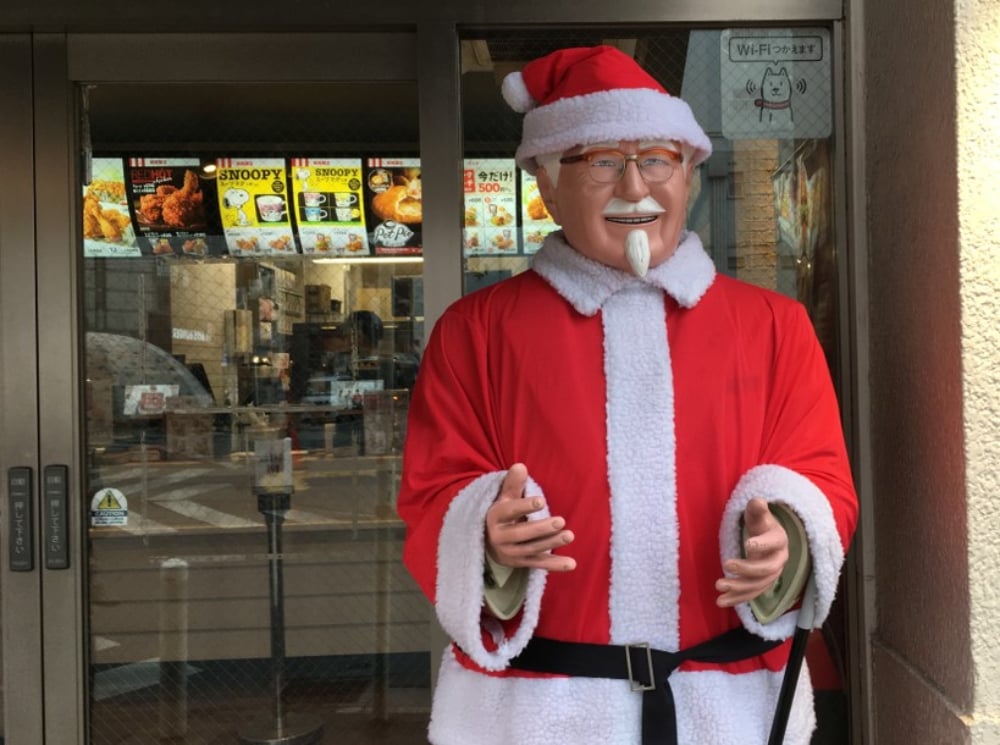Everyone complains about Christmas commercialization. But say this much for the North American Christmas — at least no single company owns the franchise. It’s different in Japan. Christmas in Japan belongs to KFC.
Tamotsu Nagata is a former longtime Vancouver resident who has since returned to his native Japan. As such he is familiar with both western and Japanese versions of the Christmas season. “In Japan,” he says, “Christmas is all about Kentucky Fried Chicken.”
It began with TV ads. As a country with very few Christians, Japan had few — if any — established Christmas traditions to fall back on as awareness of the Dec. 25 holiday grew in the postwar period. Kentucky Fried Chicken (as the company was known then) saw a gap in the market. In the 1970s they began running Japanese TV ads implying that the Colonel’s buckets were a standard means of celebrating Christmas with family. The concept caught on in a big way. “My Old Kentucky Home” became, in Japan, a Christmas song. And the KFC family bucket became as central to the day as a turkey is to Thanksgiving. “Growing up, I thought you are supposed to eat Kentucky Fried Chicken for Christmas,” Nagata recalls. “It’s as if they own Christmas here.”
KFC is not the only culinary Christmas staple in Japan, Nagata says. There is also cake. Not the fruit cakes we typically associate with Christmas — the traditional Japanese seasonal dessert is what North Americans call angel food cake. “Everybody has that for Christmas,” Nagata says. “The one with white sponge cake, whipped cream and berries, right? There’s always a Santa on top, coming down the chimney.”
In Japan, the so-called “War on Christmas” bemoaned by conservative talk show hosts has not only been lost — it was never fought in the first place. Japanese Christmas has never had any significant religious connotations. Instead it has developed in two different directions. There’s the family aspect, with its white cakes and 11 different deep-fried herbs and spices, and then there is a romantic angle. Christmas in Japan has become something of a solstice Valentine’s Day when young couples enjoy some sexy Santa time. “Couples go out, have an expensive dinner,” Nagata says. “It’s considered romantic to propose on Christmas Day.”
Meanwhile New Year’s Eve, a major couples event in the West, is not marked by dressy gala outings in Japan. “You spend time with family,” Nagata says. “It’s sort of opposite [to North America].”
Not many Asian countries have large Christian populations (the Philippines and Korea being notable exceptions) and yet Christmas has made its mark on the continent regardless. “When I lived in Hong Kong,” says one-time CBC Radio and CTV Vancouver host Aamer Haleem, “one of the things that floored me was that this largely Buddhist city-state was embracing Christmas more than I had seen anywhere else on the planet. You know, entire skyscrapers that were decorated like giant Christmas packages.”
In some cases colonialism helped spread the gospel of Christmas merry-making. But elsewhere it seems to be more a triumph of global marketing. “If you look at each holiday as a sports franchise,” Haleem muses, “Christmas is a dynasty. It’s like the Montreal Canadiens of the ’70s or the New England Patriots of the 2000s. It cannot be knocked off. Christmas as a global brand cannot be touched.”
Haleem, who grew up in an Ottawa-based Muslim family, points out that Christmas culture is driven by a powerful retail and cultural engine — and a solid foundation on the Gregorian calendar. “It’s a fixed date,” Haleem says. “Everybody knows when it is, our calendars are built around it. It’s not like people are saying ‘When’s Eid, when’s Diwali? Let’s build around that.’ Those holidays are on the lunar calendar, which is not the one we adhere to globally.”
The gift-giving aspect of Christmas tradition has also contributed to its worldwide appeal. For Nagata, Christmas in Vancouver (and at his in-laws’ home in Ontario) was a learning experience. “If you’re a kid [in Japan] you expect a present or two by your pillow or futon,” Nagata says. “The gift comes from Santa. There’s no exchanging gifts with family members in your pyjamas. So in Canada I was surprised to get gifts from family members. It was nice.”
Other seasonal aspects were more awkward. The family of Nagata’s first wife were Catholic. “I tend to avoid churches,” says Nagata, whose family once ran a Buddhist temple. “But on Christmas I was obliged to go to mass. I don’t know what’s happening, I’m just smiling. I am thinking, ‘I’m going to burn in hell.’ But my mother-in-law prayed to St. Jude for me, to save me.”
Having been introduced to North American Christmas, Nagata, although not Christian himself, still shakes his head like many church-goers over the consumer nature of the holiday as marked in Japan. “Only the commercial part came over [to Japan],” he says. “And the head of it is KFC.”
(Something similar happened with Kit Kat chocolate bars and Japanese high school graduation. Kit Kat sounds very similar to the Japanese phrase “kitto katsu,” meaning “always winning.” It’s an inspirational slogan for students taking the difficult, stressful and crucial university entrance exams. The candy brand has capitalized on that happy coincidence to make Kit Kat both a scholastic good luck charm and a reward for success.)
Now back in Japan, what does Nagata miss about the Canadian holiday season? “Japan does not have a tradition of re-running the same movies every year,” he says. “It’s something that’s lacking over here. I used to watch A Muppet Christmas Carol often. That’s a hole in my life, for sure.”
Ultimately Christmas is just one of many western cultural ideas and practices that have gone through a Japanese makeover. “We adopt the culture,” Nagata says, “and we overdo it. That’s the Japanese way.”
Tomorrow: Christmas for a Sikh family in Bible-Belt Abbotsford. And if you missed it, yesterday we learned about the pink Christmas tree that Aamer Haleem’s Muslim family put up every year. ![]()
Read more: Media
















Tyee Commenting Guidelines
Comments that violate guidelines risk being deleted, and violations may result in a temporary or permanent user ban. Maintain the spirit of good conversation to stay in the discussion.
*Please note The Tyee is not a forum for spreading misinformation about COVID-19, denying its existence or minimizing its risk to public health.
Do:
Do not: